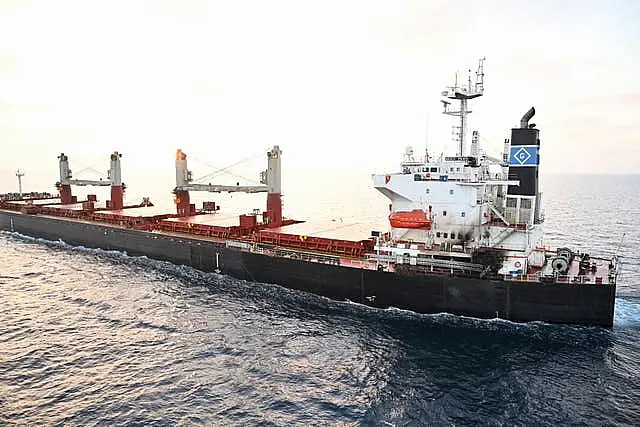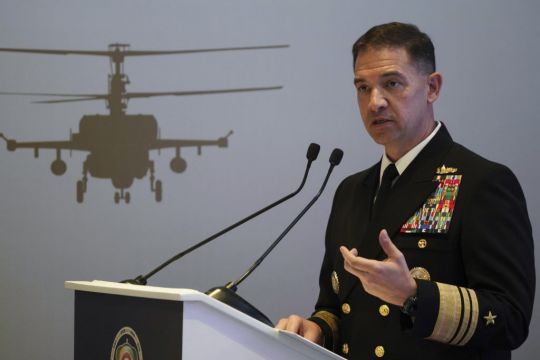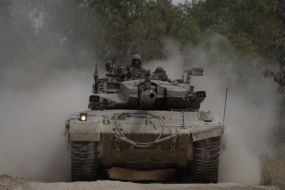Iran is “very directly involved” in ship attacks that Yemen’s Houthi rebels have carried out during Israel’s war against Hamas, the US navy’s top commander in the Middle East has said.
However, Vice Admiral Brad Cooper, the head of the navy’s 5th Fleet, stopped short of saying Tehran directed individual attacks by the Houthis in the Red Sea and the Gulf of Aden.
Vice Adm Cooper acknowledged that attacks associated with Iran have expanded from previously threatening just the Persian Gulf and its Strait of Hormuz into waters across the wider Middle East.
He told the Associated Press: “Clearly, the Houthi actions, probably in terms of their attacks on merchant shipping, are the most significant that we’ve seen in two generations.

“The facts simply are that they’re attacking the international community; thus, the international response I think you’ve seen.”
Iran’s mission to the United Nations and the Houthi leadership in Yemen’s capital, Sanaa, did not respond to a request for comment.
However, the Houthis later claimed to have attacked a US-flagged vessel, something that the 5th Fleet dismissed as “patently false”.
Since November, the Iranian-backed Houthis have launched at least 34 attacks on shipping through the waterways leading up to Egypt’s Suez Canal, a vital route for energy and cargo coming from Asia and the Middle East onward to Europe.
The Houthis, a Shia rebel group that has held Sanaa since 2014 and been at war with a Saudi-led coalition backing Yemen’s exiled government since 2015, link their attacks to the Israel-Hamas war.
However, the ships they have targeted increasingly have tenuous links to Israel – or none at all.
In recent days, the US has launched seven rounds of air strikes on Houthi military sites, targeting air bases under the rebels’ control and suspected missile launch sites.

The tempo of Houthi attacks on shipping appears to have slowed for the time being as the US and its allies have increased their naval patrols in the region.
However, risks for the global economy remain as many ships continue to bypass that route for a longer trip around Africa’s southern tip.
That has meant lower revenue for Egypt through the Suez Canal, a vital source of hard currency for the country’s troubled economy, as well as higher costs for shipping that could push up global inflation.
As Vice Adm Cooper took command of the 5th Fleet in 2021, the threat to shipping focused primarily around the Persian Gulf and its narrow mouth, the Strait of Hormuz, through which a fifth of all oil traded passes.
A series of attacks blamed on Iran and ship seizures by Tehran followed the collapse of Iran’s nuclear deal with world powers.
#USNavy Photos of the Day!
1️⃣ Aircraft assigned to the @CVN70 perform a flyover during a trilateral exercise
2️⃣ RP 1 Alfonso Barnes takes E-7 Navy-Wide Advancement Exam
3️⃣ Recruits stand in formation at #RTC
4️⃣ Rear Adm. Thomas R. Buchanan conducts a pass-in-review ceremony pic.twitter.com/IQsLBrOqCj— U.S. Navy (@USNavy) January 19, 2024
The navy commander acknowledged the threat from Iran’s proxies and that its distribution of weapons extended from the Red Sea out to the far reaches of the Indian Ocean.
The US has blamed Iran for recent drone attacks on shipping, and a US-owned cargo vessel came under attack from the Houthis in the Gulf of Aden last week.
So far, Iran has not been directly involved in fighting either Israel or the US since the war in Gaza began on October 7th. However, Vice Adm Cooper maintained Iran had been directly fuelling the Houthi attacks on shipping.
He said: “What I’ll say is Iran is clearly funding, they’re resourcing, they are supplying and they’re providing training.
“They’re obviously very directly involved. There’s no secret there.”
Vice Adm Cooper described the ship attacks striking the Middle East as the worst since the so-called Tanker War of the 1980s.
It culminated in a one-day naval battle between Washington and Tehran, and also saw America accidentally shoot down an Iranian passenger jet, killing 290 people.
Vice Adm Cooper’s reference to the tensions from more than three decades ago underlines just how precarious the situation in the wider Middle East has become as worries of a regional conflict over the Israel-Hamas war grow.
CENTCOM Status Update on Missing U.S. Navy Seals
We regret to announce that after a 10-day exhaustive search, our two missing U.S. Navy SEALs have not been located and their status has been changed to deceased. The search and rescue operation for the two Navy SEALs reported… pic.twitter.com/OAMbn1mwK8— U.S. Central Command (@CENTCOM) January 21, 2024
He spoke to the AP from the sidelines of a drone conference in Abu Dhabi, the capital of the United Arab Emirates. Under his command of the 5th Fleet, the naval force has created Task Force 59, a drone fleet to bolster its patrol of waterways in the region.
Today, a variety of drones provide the 5th Fleet coverage across some 10,000 square miles of Middle East waters the US navy otherwise would not have eyes on, Vice Adm Cooper said.
That helps its efforts to interdict suspected drug and weapons shipments.
US forces this month seized Iranian-made missile parts and other weaponry from a ship bound for the Houthis in a raid that saw two Navy Seals go missing. The US military’s Central Command said on Sunday it now believes the Seals are dead.
Vice Adm Cooper’s command is set to end in February with the upcoming arrival of Rear Adm George Wikoff in Bahrain. He noted the US navy and merchant shippers still face a serious threat from the Houthis as he prepares to leave.
He said: “What we need is a Houthi decision to stop attacking international merchant ships. Period.”







